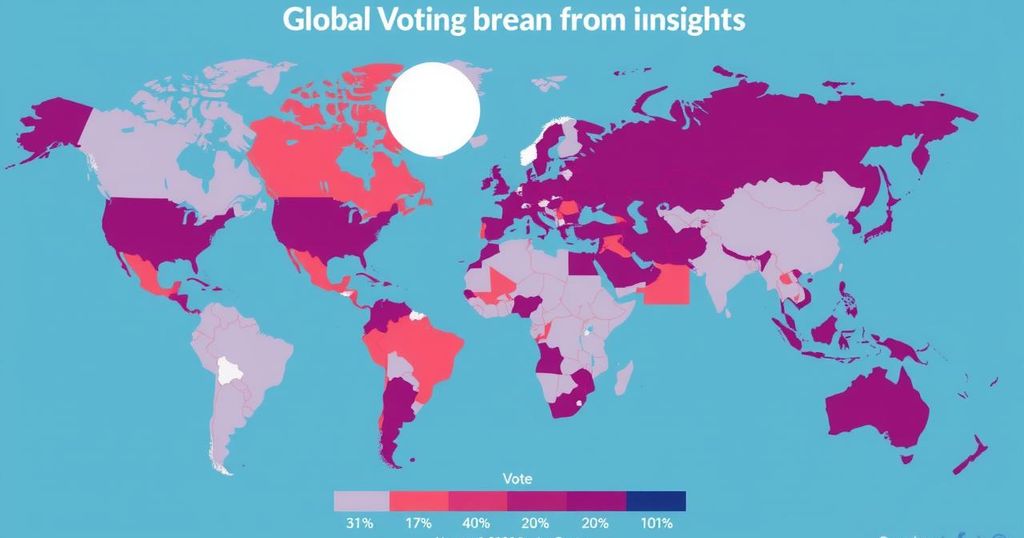Global Elections of 2024: A Reflection on Democracy and Its Challenges

In 2024, over 60 countries saw nearly half the world’s population vote, reflecting a historic moment for democracy. The elections revealed a tendency among voters to prioritize individual needs over collective welfare, with economic concerns overshadowing critical issues like climate change. High-profile leaders faced defeat due to voter dissatisfaction, while the power dynamics among world leaders like Trump and Putin pose challenges for future democratic integrity and international relations.
In 2024, an unprecedented number of nations embraced democratic participation, with over 60 countries, representing nearly half of the global population, electing their leaders. This remarkable event illustrated a significant evolution in democracy but also revealed a troubling focus on individual interests, driven by fear and greed, rather than collective welfare. The elections indicated a preference for immediate economic concerns over long-term issues such as climate change, ultimately leading to the defeat of several incumbents, including U.S. President Joe Biden and U.K. Prime Minister Rishi Sunak.
Across various nations, political trends reflect similar sentiments, with significant shifts observed in nations such as India, where Prime Minister Narendra Modi’s party experienced a decline in electoral support, and South Africa’s ruling party lost its majority for the first time. Notably, the results in France, where President Emmanuel Macron’s party also lost ground, demonstrated that populism, while influential, could still be contested. The ramifications of these elections are far-reaching, as they underscore the importance of economic stability while also calling into question the legitimacy of political leaders in less democratic contexts, such as Russia, where Vladimir Putin secured a staggering 87% of the vote amid oppressive political conditions.
The outcomes of 2024 will shape international relations, particularly the dynamics between leaders like Trump and Putin, as they navigate challenges such as the ongoing conflict in Ukraine. The potential for a Trump-Putin alliance threatens to undermine global democratic values, presenting a test for both domestic and international discourse as electoral outcomes from one nation reverberate across the globe. As countries like Syria emerge from prolonged authoritarian rule, the lessons learned from these elections must be leveraged to support and sustain democratic ideals, ensuring that the momentum seen in 2024 is not lost or retraced in the future.
The article reflects on the significant global trend of increased democratic engagement in 2024, highlighting the elections held across over 60 countries representing nearly half the world’s population. It discusses the implications of these elections, emphasizing how voter behavior is often influenced by immediate economic concerns rather than collective societal issues, such as climate change. The events of this year have notable parallels in historic electoral patterns, especially regarding incumbents losing power due to the electorate’s demand for change propelled by economic dissatisfaction. Furthermore, it explores the challenges faced by leaders in established democracies and the ongoing struggles in less democratic contexts, particularly with respect to human rights and political freedoms. The article also emphasizes the interconnected nature of global politics, whereby the choices made by voters in one nation can have substantial ramifications on the international stage, especially in terms of foreign policy and governance in conflict-afflicted areas. The need for vigilant support for democratic practices is highlighted as emerging democracies seek to define their political futures amidst historical challenges.
In conclusion, the elections of 2024 signify a notable turning point in global democratic participation, demonstrating both progress and the prevailing challenges within electoral politics. The outcomes reflect deep-rooted issues such as economic anxiety and populism that continue to shape the modern political landscape. Furthermore, the significant interplay between national elections and global governance underscores the urgent necessity for all nations to nurture democratic values, ensuring that the right to vote remains a powerful tool for collective well-being in the face of rising authoritarianism.
Original Source: www.cnn.com







